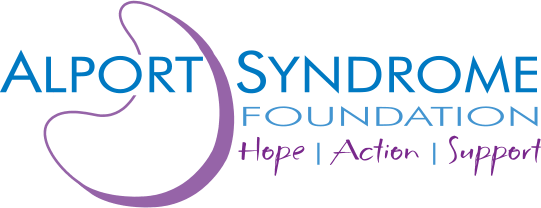
Understanding Adult Alport Treatment Medications
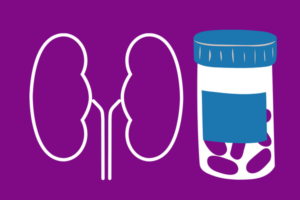 Though no FDA-approved therapy exists for Alport syndrome, there are recommended standards of care. ASF often receives questions from patients and clinicians about the latest medication options for adult patients.
Though no FDA-approved therapy exists for Alport syndrome, there are recommended standards of care. ASF often receives questions from patients and clinicians about the latest medication options for adult patients.
To best address questions related to current treatment options, medication side effects, drug interactions, pregnancy and medications, and more, we asked ASF Medical Advisory Committee members Dr. Caitlin Carter and Dr. James Simon, as well as Alport expert Professor Neil Turner from the U.K., to help us prepare a new educational document entitled “Adult Treatment Overview: Medications.” This free, downloadable mini-guide answers many frequently asked questions. It offers helpful tips for managing these treatments and lists further questions to discuss with your nephrologist.
Major Grants Awarded to Researcher, Collaborators
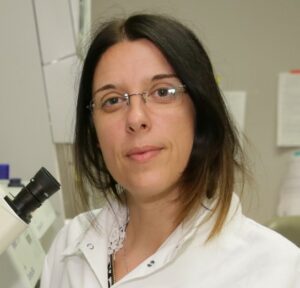 Last month, the GOFARR Laboratory for Organ Regenerative Research and Cell Therapeutics in Urology at Children’s Hospital Los Angeles received two grants from the National Institutes of Health (NIH).
Last month, the GOFARR Laboratory for Organ Regenerative Research and Cell Therapeutics in Urology at Children’s Hospital Los Angeles received two grants from the National Institutes of Health (NIH).
Laura Perin, PhD (ASF Scientific Advisory Research Network), and Stefano Da Sacco, PhD, are Co-Principal Investigators on a five-year $3.2M Alport syndrome-focused grant studying the use of micro-RNA therapy in an Alport mouse model
Dr. Perin is also the Principal Investigator on a secondary two-year $2M grant shared with her GOFARR collaborators. This grant supports work on an innovative “kidney-on a-chip” platform. Learn more about these grants on our website.
“Alport patients are the major contributors to our research,” says Dr. Perin, who received seed funding from ASF in 2011 to study amniotic fluid stem cells and Alport syndrome. “We are very grateful to all the moms that donated their amniotic fluid to advance our research. Thanks to their amniotic fluid donation we can obtain Alport renal cells, a fundamental component of our chip system.”
Cars and Kidneys Event to Support ASF
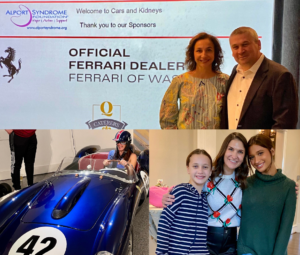 Members of our community certainly got creative this year in finding ways to support ASF, and we are very grateful. The most recent example is the Onder Family who partnered with Ferrari of Washington and Q Catering to host the “Cars and Kidneys” event at their home in November. In addition to a $10,000 contribution to Alport Syndrome Foundation, Ferrari of Washington donated a 2-night stay at a resort in Middleburg, VA, along with a Ferrari to use for the duration of their stay, to one lucky winner.
Members of our community certainly got creative this year in finding ways to support ASF, and we are very grateful. The most recent example is the Onder Family who partnered with Ferrari of Washington and Q Catering to host the “Cars and Kidneys” event at their home in November. In addition to a $10,000 contribution to Alport Syndrome Foundation, Ferrari of Washington donated a 2-night stay at a resort in Middleburg, VA, along with a Ferrari to use for the duration of their stay, to one lucky winner.
The event raised $26,802 and brought friends and family together in support of ASF’s efforts.
Longtime ASF member Cindy Onder noted, “It was nice to be able to merge my husband’s car obsession with our annual ASF campaign efforts in honor of my daughter. We had so much fun putting this together with our community and educating those who have never heard of Alport syndrome.
Innovative Alport Mouse Model Therapy Explored
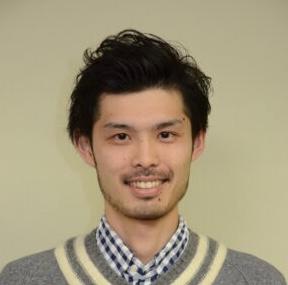 Kohei Omachi, PhD, is the lead author on a recent Kidney360 research article, which outlines a novel approach to potentially treating Alport syndrome.
Kohei Omachi, PhD, is the lead author on a recent Kidney360 research article, which outlines a novel approach to potentially treating Alport syndrome.
“Kidney fibrosis, a condition in which the kidneys become stiff and non-functional, occurs in many chronic kidney diseases, and controlling its progression is a critical goal for therapy. In this study, we found that the drug REN001, which activates PPARdelta, slowed progression of fibrosis in mice that model Alport syndrome. If future studies reveal an additive or synergistic effect when combined with the existing standard of care, activation of PPARdelta should be considered for trials in patients with Alport syndrome and other forms of chronic kidney disease,” notes Dr. Omachi.
Transplant Innovation: FREEDOM-1 and 2 Studies
 While some clinical trials open to Alport syndrome patients are designed to explore ways to slow progression of the disease, another is currently exploring how to unlock a future free from immunosuppression drug treatment for post-kidney transplant patients with Alport syndrome and other kidney diseases.
While some clinical trials open to Alport syndrome patients are designed to explore ways to slow progression of the disease, another is currently exploring how to unlock a future free from immunosuppression drug treatment for post-kidney transplant patients with Alport syndrome and other kidney diseases.
While immunosuppressive medicines (also known as anti-rejection medicines) are used to prevent the immune system from rejecting the new kidney, they carry the risk of infection, cancer, and neurotoxicity (difficulty sleeping, tremor or tingling sensations in the limbs). Additionally, they can produce other health complications that may affect the longevity of your newly transplanted kidney, including nephrotoxicity (abnormal kidney function), diabetes (high blood sugar), and cardiovascular (heart) disease.
The goal of the FREEDOM-1 and FREEDOM-2 clinical trials is to help determine if a living donor kidney transplant and a stem cell transplant with the investigational cell therapy could help prevent the rejection of the donor kidney and eliminate the need for life-long immunosuppressive medicines.
For more information and/or to take the pre-screener to see if you could take part, visit https://freedom1study.com and/or https://freedom-2study.com.
Honoring Our Community
 In 2022, more than 70 individuals have been recognized through gifts made in their honor or in their memory. These gifts are particularly meaningful as they help connect a name to those who are living with, or have lived, a journey with Alport syndrome in some way – as a patient, family member, or other loved one.
In 2022, more than 70 individuals have been recognized through gifts made in their honor or in their memory. These gifts are particularly meaningful as they help connect a name to those who are living with, or have lived, a journey with Alport syndrome in some way – as a patient, family member, or other loved one.
Thank you to those who contributed thoughtful gifts to ASF in this way over the last year. We are always grateful to be able to inform someone that a gift has been made in their honor, or in memory of someone that meant so much to them.
Gifts donated to ASF in honor/memory are welcome year-round. To see this year’s list, visit our website.
View our Newsletters and Announcements page for an archive of prior communications.
